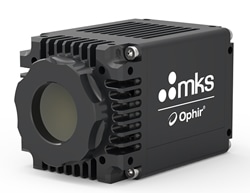MKS Instruments, Inc., a global provider of technologies that enable advanced processes and improve productivity, has announced the Ophir® SP1201 and SP1203, compact, InGaAs camera-based beam profiling systems for real-time viewing and measuring of the optical performance of laser beams. Designed for high sensitivity imaging, the SP1201 features a QVGA resolution InGaAs camera and the SP1203 features a high-resolution VGA InGaAs camera; both also include BeamGage® Professional beam profiling software. The cameras accurately capture and analyze wavelengths from 900nm - 1700nm. They feature a compact design, small pixel pitch (15µm – 30 µm), high frame rates in excess of 60 frames per second, excellent signal-to-noise ratio, and a high-speed GigE (Gigabit Ethernet) interface. They are ideal for measuring CW and pulsed laser profiles in eye-safe military, telecom, and medical laser and LED applications, as well as for co-alignment of laser sources.

Both systems incorporate BeamGage® Professional, the industry's most advanced beam analysis software. BeamGage includes a rich graphical interface and a comprehensive set of algorithms and calculations needed to make accurate, ISO measurements, such as such as beam size, shape, uniformity, divergence, mode content, and expected power distribution. The software provides advanced image processing and features the company's patented UltraCal™ algorithm for the industry's highest accuracy measurements. BeamGage Professional also includes such capabilities as partitioning of the camera output for separate analysis of multiple laser beams from sources such as fiber, a .NET interface for full remote control when integrating beam analysis into an automated application, and camera sharing.
The SP1201 and SP1203 also include a high-speed GigE Power Over Ethernet (POE) interface for long cable lengths and easy power supply placement. Triggering allows for the capture of every pulse of a pulsed laser system. The system also supports automatic selection of the best NUC (non-linear uniform correction) look-up table for gain and exposure settings.
Availability
The Ophir SP1201 and SP1203 InGaAs camera-based beam profiling systems are available now.